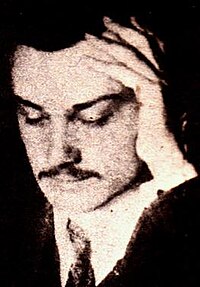Our website is made possible by displaying online advertisements to our visitors.
Please consider supporting us by disabling your ad blocker.
Ioan C. Filitti
Ioan Constantin Filitti | |
|---|---|
 Filitti, ca. 1913 | |
| Born | May 8, 1879 |
| Died | September 21, 1945 (aged 66) |
| Other names | Ion C. Filitti, Jean C. Filitti, F. K. |
| Academic background | |
| Influences | Edmund Burke, Petre P. Carp, Titu Maiorescu, Ernest Renan, Hippolyte Taine |
| Academic work | |
| Era | 20th century |
| School or tradition | Conservatism, Junimea |
| Main interests | social history, genealogy, heraldry, legal history, political history |
| Notable works | Din arhivele Vaticanului (1913–1914) Domniile române sub Regulamentul Organic (1915) Arhiva Gheorghe Grigore Cantacuzino (1919) Pagini din istoria României moderne (1935) Conservatori și junimiști în viața politică românească (1936) |
| Influenced | P. P. Panaitescu |
Ioan Constantin Filitti (Romanian pronunciation: [iˈo̯aŋ konstanˈtin fiˈliti]; first name also Ion; Francized Jean C. Filitti; May 8, 1879 – September 21, 1945) was a Romanian historian, diplomat and conservative theorist, best remembered for his contribution to social history, legal history, genealogy and heraldry. A member of the Conservative Party and an assistant of its senior leader Titu Maiorescu, he had aristocratic (boyar) origins and an elitist perspective. Among his diverse contributions, several focus on 19th-century modernization under the Regulamentul Organic regime, during which Romania was ruled upon by the Russian Empire. As a historian, Filitti is noted for his perfectionism, and for constantly revising his own works.
I. C. Filitti had an auspicious debut in diplomacy and politics, but his career was mired in controversy. A "Germanophile" by the start of World War I, he secretly opposed the pact between Romania and the Entente Powers, and opted to stay behind in German-occupied territory. He fell into disgrace for serving the collaborationist Lupu Kostaki as Prefect and head of the National Theater, although he eventually managed to overturn his death sentence for treason. Filitti became a recluse, focusing on his scholarship and press polemics, but was allowed to serve on the Legislative Council after 1926.
In his political tracts, written well after the Conservative Party's demise, I. C. Filitti preserves the orthodox conservative principles of Maiorescu. His attachment to boyar tradition was expanded into a critique of centralized government, etatism and Romanian liberalism. Toward the end of his life, he supported the dictatorial regime known as National Renaissance Front.
Previous Page Next Page


